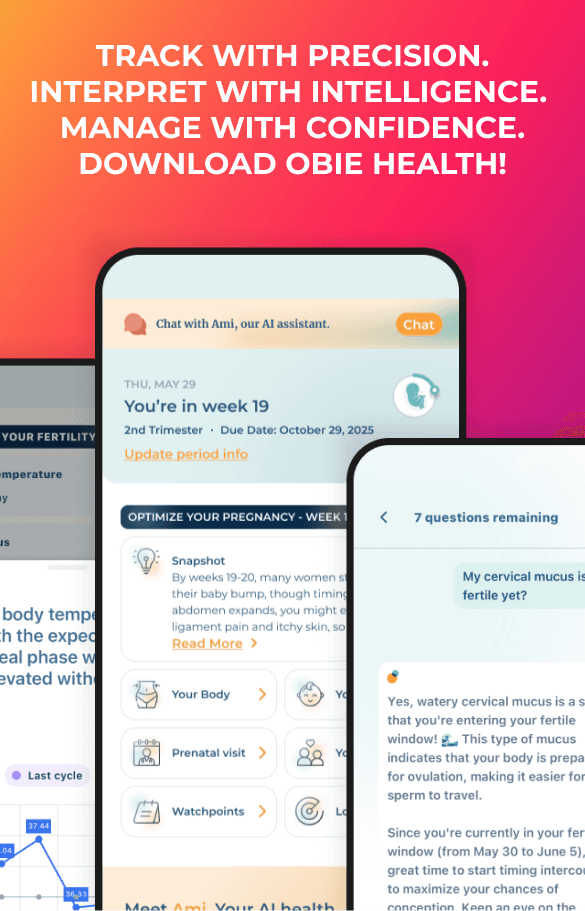Vaccination and Menstrual Timing: What Women Should Know About Immune Shifts and Their Cycle
Obie Editorial Team

Most women are familiar with mood changes, cramps, and energy shifts during the menstrual cycle. But another lesser-known aspect of this cycle is how closely it’s connected to the immune system. Recent studies suggest that the immune system doesn’t just passively ride along with hormonal fluctuations—it actually interacts with them. One area where this connection becomes especially relevant is vaccination.
How the Menstrual Cycle Influences Immune Function
The menstrual cycle is more than a reproductive rhythm; it’s a dynamic immunological landscape. Hormones like estrogen and progesterone influence how the immune system responds to both external and internal triggers. Here's a quick breakdown:
- Follicular Phase (start of period to ovulation): Estrogen levels rise, enhancing immune surveillance and antibody production. Women may feel more resilient during this phase.
- Ovulation: A brief immune dip may occur to allow for potential fertilization. This temporary suppression can also increase susceptibility to infections.
- Luteal Phase (post-ovulation to start of next period): Progesterone dominates, which can modulate immune responses by promoting a more anti-inflammatory environment. For some women, this is when autoimmune flare-ups or inflammatory symptoms tend to worsen.
Because of these shifts, immune responses—including how the body reacts to a vaccine—can vary depending on where a woman is in her cycle.
What We’re Learning About Vaccination and Menstrual Changes
As millions of women worldwide received COVID-19 vaccinations, many noticed unexpected changes in their menstrual cycles. Research now supports that this wasn’t just anecdotal.
A 2024 study by Rahimi Mansour et al. examined over 1,000 women who had received COVID-19 vaccines. Their findings revealed that a significant number of participants experienced menstrual disturbances in the weeks following vaccination. These changes included:
- Delayed or early onset of menstruation
- Heavier or lighter bleeding
- Increased cramping or clotting
- Missed periods in otherwise regular cycles
These effects were generally short-lived, with cycles returning to normal within a couple of months. Still, the findings raise important questions about how vaccines interact with hormonal and immune systems.
What Might Be Happening Biologically
Vaccines are designed to trigger a strong immune response, which can temporarily influence the same systems that regulate your menstrual cycle. Factors that may play a role include:
- Inflammatory response: Vaccination activates immune cells and signaling molecules, which could briefly disrupt hormone production or uterine lining behavior.
- Stress and immune load: The body may prioritize immune defense over reproductive processes, leading to cycle delays or changes.
- Hormonal-immune crosstalk: Estrogen and progesterone receptors exist on immune cells, so changes in hormone levels can influence how your body reacts to the vaccine—and vice versa.
What You Can Do to Support Your Body
While cycle changes post-vaccination are usually temporary and not harmful, it’s understandable to want to manage or anticipate them. Here are some practical ways to support your cycle and immune system during vaccination:
- Track your cycle using the Obie app or use a journal to note any changes post-vaccination
- Schedule vaccinations during the follicular phase if possible, when the immune system is typically more robust
- Prioritize rest, hydration, and nutrient-dense foods in the days following vaccination
- Talk to your healthcare provider if cycle changes persist beyond 2–3 months
Why This Matters
Understanding the intersection of menstrual cycles and immune responses doesn’t just help women prepare for potential changes—it empowers them to make informed choices about their health. As research continues to uncover these complex relationships, it’s clear that timing, hormones, and immunity are deeply intertwined.
Source:
Rahimi Mansour F, Keyvanfar A, Najafiarab H, Hooshmand Chayijan S, Farzaneh F, Mortezaei G. Menstrual Cycle Disturbances after COVID-19 Vaccination: A Cross-Sectional Study. Int J Fertil Steril. 2024 Jun 9;18(3):201-206. doi: 10.22074/ijfs.2024.2016339.1579. PMID: 38973271; PMCID: PMC11245586.







